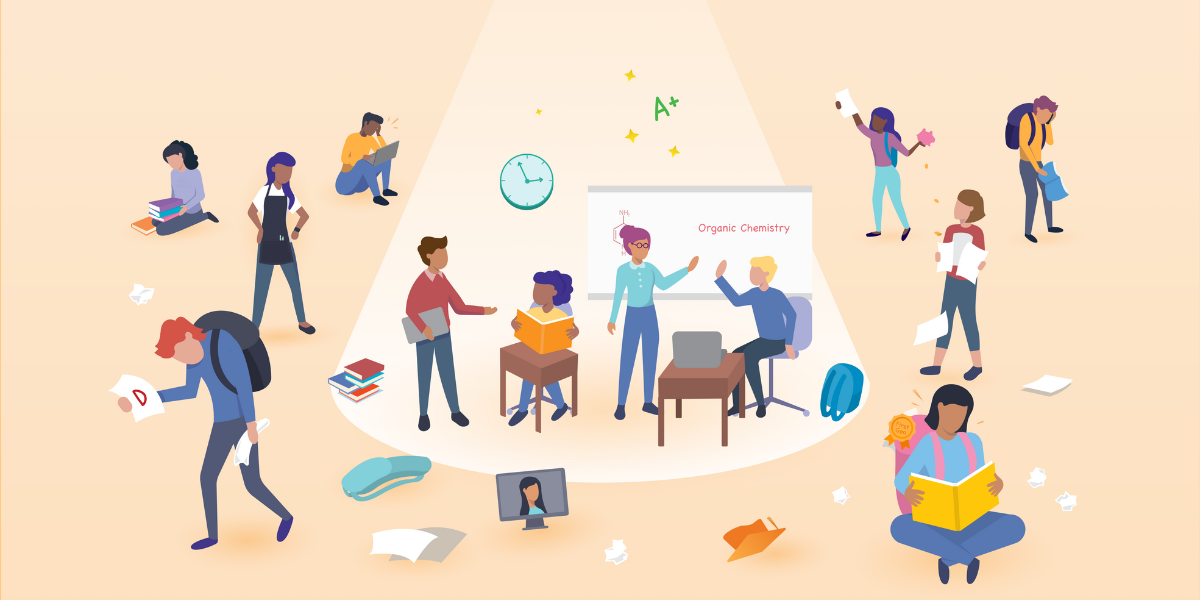Loneliness has emerged as a significant challenge in higher education. While college is often seen as a time for social and academic growth, many students feel disconnected from their peers and campus environment. This isolation, that I’m coining as "lonely learning," affects both their academic success and wellbeing. Addressing this issue is critical, as it can lead to disengagement, poor academic performance, and mental health struggles. Institutions must create opportunities for connection, helping students feel a sense of belonging. Peer learning programs, such as peer tutoring, offer a powerful strategy to address both academic and emotional needs.
Understanding Lonely Learning
Lonely learning occurs when students feel isolated in their academic journey. This disconnection can stem from various factors, including the isolation caused by remote learning during the pandemic, social media overuse, a lack of in-person community and/or physical social interaction. Academic pressure, without the support of peers or faculty, can further intensify these feelings.
Disconnected students often withdraw from their coursework, avoid seeking help, and struggle to feel like they belong in the academic community. This can result in poor performance and increased stress, which may even lead to dropping out. Research shows that students who don’t feel a sense of belonging are more likely to leave college early, emphasizing the importance of addressing lonely learning as soon as possible.
The Role of Peer Learning in Combating Loneliness
Peer learning programs like peer tutoring, mentoring, and coaching provide a key solution to lonely learning. These initiatives not only help students improve academically but also foster meaningful connections. When students participate in peer tutoring, they receive academic assistance while also connecting with someone who understands their challenges. This dual benefit helps build a sense of community and belonging, essential for students who feel disconnected.
Peer tutoring is more than just academic support; it is a lifeline for students who might otherwise feel isolated. By connecting with peers who empathize with their struggles, students find both academic and emotional guidance, creating bonds that extend beyond the classroom.
Creating Intentional Connections Through Peer Learning
While the primary goal of peer tutoring is academic improvement, its secondary benefit is the formation of strong relationships. These connections often provide a support network that helps students navigate the challenges of college life. By fostering both academic and social development, peer learning becomes a holistic support system.
Such connections are particularly valuable for first-generation students, those from underrepresented backgrounds, and students who lack social support outside of the academic setting. Feeling connected to peers keeps students engaged in their studies and encourages them to participate in campus activities, increasing their likelihood of staying through to graduation.
Peer learning also helps students develop essential life skills like communication, collaboration, and problem-solving. These skills are crucial not only for academic success but for building lasting relationships in personal and professional contexts. The confidence gained through peer learning can alleviate the social anxiety often tied to loneliness.
Addressing the Whole Student: Academic & Emotional Support
To effectively combat lonely learning, colleges and universities must adopt a holistic approach that addresses both academic and emotional well-being. Peer learning programs are particularly effective because they meet students’ academic needs while also fostering social connections that contribute to their overall well-being.
Peer coaching programs, for instance, create safe spaces where students can discuss challenges with peers who relate to their experiences. By integrating peer learning with mental health support, institutions can build a comprehensive support system that helps students navigate the academic and emotional aspects of college life.
Institutional Initiatives
To address lonely learning, colleges and universities can take several key actions. First, institutions should expand access to peer learning programs, ensuring that all students—regardless of academic standing—have opportunities to participate. Promoting these programs through campus-wide outreach and training peer tutors to provide both academic and emotional support can increase engagement.
Second, institutions should prioritize inclusive spaces where students can connect. Offering a mix of virtual and in-person opportunities for peer learning and social interaction ensures flexibility, especially as students continue to balance different learning modes.
Finally, creating a culture that normalizes seeking help is crucial. Promoting peer learning as a resource for both academic and emotional support can help break down the stigma associated with asking for help, fostering a more connected and supportive campus environment.
Strategically Addressing Lonely Learning
Lonely learning is an increasingly prevalent issue in higher education, but it can be addressed through strategic initiatives that focus on connection and support. Peer learning programs like peer tutoring create opportunities for academic improvement and meaningful social connections, helping students succeed both academically and emotionally. By prioritizing these initiatives, colleges and universities can reduce feelings of isolation and increase retention and persistence to graduation, ensuring a more connected and successful student body.
Let's prioritize peer learning programs that foster both academic success and meaningful connections. Schedule a call with Knack to start advocating for peer learning programs at your institution so we can work together to ensure every student thrives academically and emotionally.
